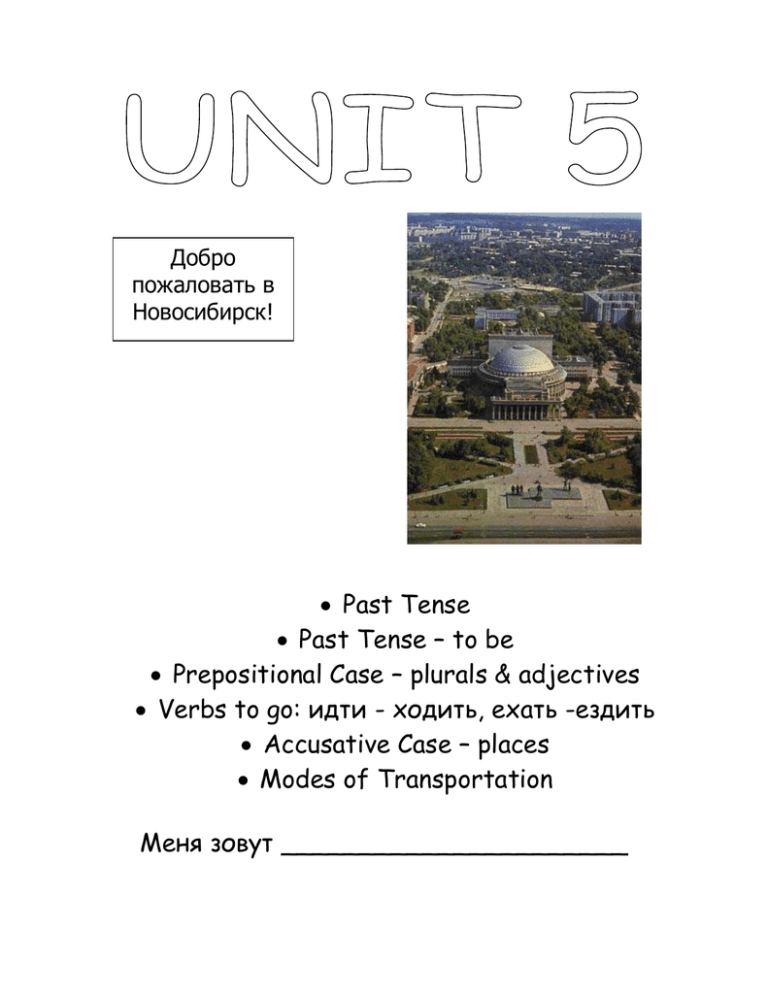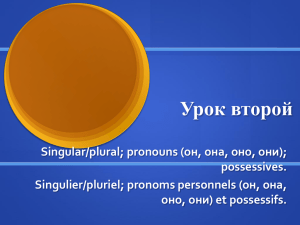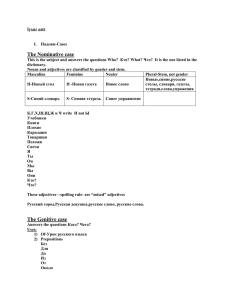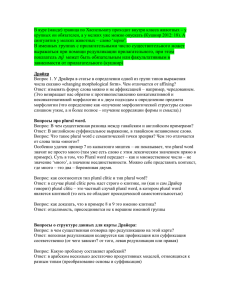Past Tense of Russian Verbs
реклама

Добро пожаловать в Новосибирск! Past Tense Past Tense – to be Prepositional Case – plurals & adjectives Verbs to go: идти - ходить, ехать -ездить Accusative Case – places Modes of Transportation Меня зовут ______________________ Past Tense of Russian Verbs Forming the past tense in Russian is…EASY! No, I’m not even joking!! (ура ура!) Step 1: Drop the ___________ from the infinitive. Step 2: Add the following endings: Masculine Feminine Plural Plural subject pronouns include ______, ______(even the formal version), and _______. __________ always agrees with the gender of the person being addressed. Let’s fill out the chart with the past tense of these verbs: знать читать жить говорить Masc Fem Plural Reflexive verbs: the “ся” changes to “сь” in the fem and plural forms. Example: Oн занимался. Она надеялась. Они старались. Exceptions…(of course there are exceptions!) 1st conjugation “ё” variation verbs ending in “вать” , drop the whole ending! 1. Давать – to give дал, дала, дали 2. Вставать – 3. Преподавать – Быть = to be, but more like…not to be... EXCEPT IN THE PAST!!!!!! As you know, there is no present tense version of the verb “to be”. However, there is a past tense version! No more caveman talk! “To be” in the past tense = __________________ **Remember that the verb “to be” can only be followed by adjectives or locations! Not other _____________! Masculine Neuter Feminine Plural Боб в школе. Vs. Боб был в школе. Анна смешная. Vs. Анна была смешная. Oкно тяжёлое. Vs. Окно было тяжёлое. Мои друзья на пляже. Vs. Мои друзья были на пляже. Translate the following sentences: 1. The man was happy when he was at home. 2. The woman was working in the garden. Грамматика –PREPOSITIONAL CASE…continued As you know, the prepositional case is often referred to as the “locative case” because it denotes WHERE something is located. в/во = to, at, in (во is only used before words that begin with two consonants if the first consonant is в or ф. Во Флориде, во Франции, во Владивостоке.) Question word: = на = on, sometimes at It can also be used when talking ABOUT someone or something. о, об = about (об before a vowel sound) Question words: = = Review: в/на/o + noun with the following endings… Singular only Masc Neuter Fem Add е Change “o” to e Change “a & я” to e Change “ь” to e Change “ь” to и Change “й” to e Never write “ие” as the last two letters in the prepositional case. Write “ии” instead. Nominative Prepositional Калифорния в Калифорнии Foreign words ending in “о, и, у” do not change in the prepositional case. Nominative Prepositional Колорадо в Колопадо Making nouns plural in the prepositional case. Nominative Consonant O A Й Ь (masc) E Я Ь (fem) Singular Prepositional Plural Prepositional Add/change to “ e” Change to: ие - ии Change to “e” Change to: Change to “и” Change to: Change “ие – ии” Change to : Try these places in the prepositional plural: 1. 2. 3. 4. 5. 6. 7. 8. in the factories in the stores in the hotels in the train stations at the squares in the museums in the post offices in the apartments Making adjectives plural in the prepositional case. Replace the adjectival ending with the following: Masc/Neuter Feminine ом ой Hard (ый, ой) Plural ый = ых новый большой Soft (ий) В новом В большом В новой В большой ой = их В новых В больших ем ей их синий Spelling rules В синем В синей В синих ем ей их В хорошем В хорошей В хороших хороший Modifiers change too! Masc Neuter Fem Plural Nominative мой, наш чей, этот моё, наше, моя, наша, мои, наши, чьё, это чья, эта чьи, эти Prepos. в моём нашем чьём этом в моём нашем чьём этом в моей нашей чьей этой в моих наших чьих этих


